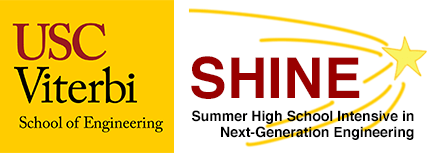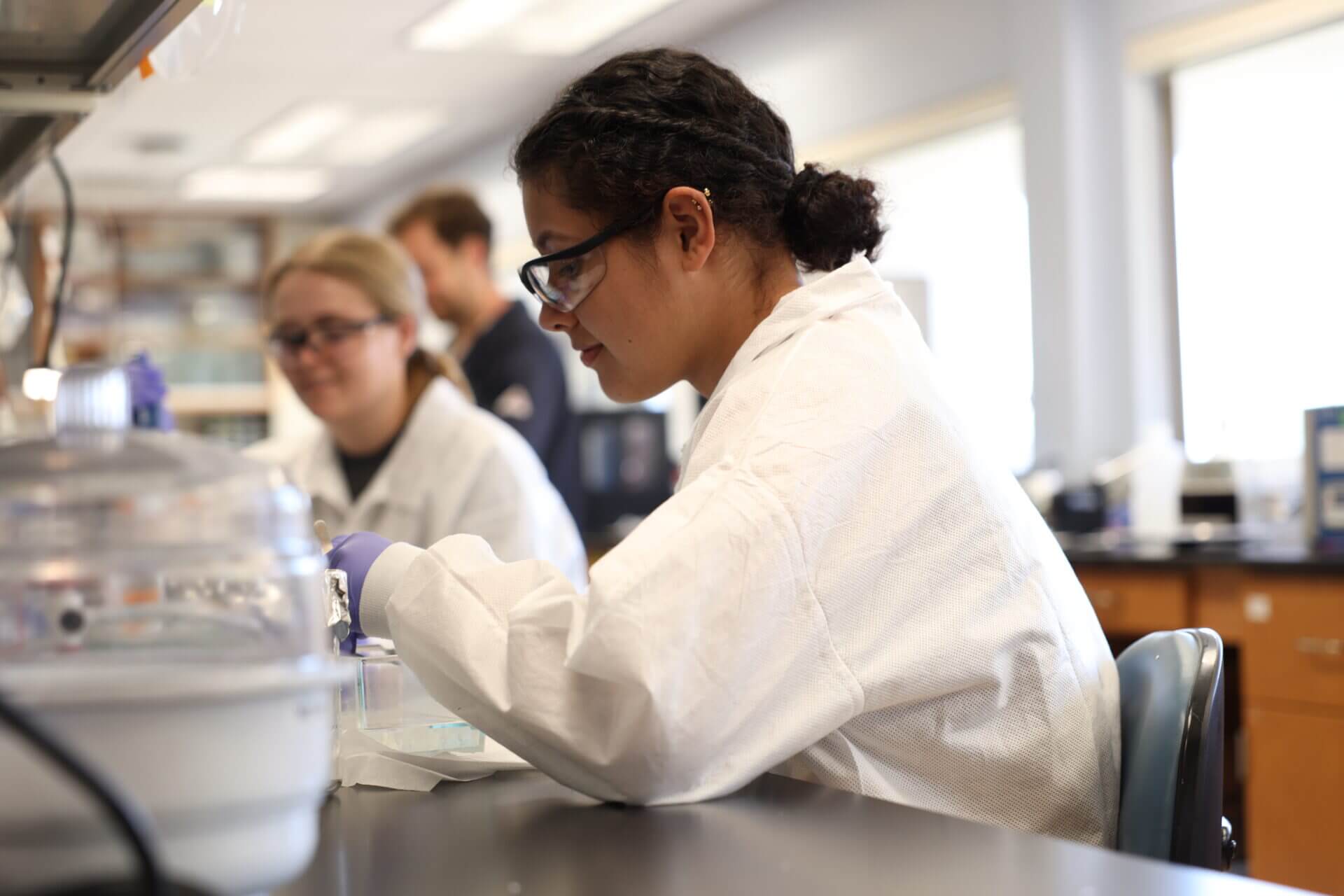
Frequently Asked Questions (FAQs)

Important Information
Click here for the Application Checklist of materials necessary for completing the online application.
- Plan ahead - applications with all required materials that are complete by 2/16/2024 will have an advantage; this includes the application itself and the application fee of $50. We must receive at least two letters of recommendation from STEM teachers before or no later than 2/28/2024. We recommend that your letter of recommendations arrive on 2/26/2024. See our Application Checklist for tips on how to ensure your teacher letters come in by the deadline.
- February 16, 2024, is also the deadline for scholarship consideration. See more information about scholarships in the FAQ’s General Questions section and here.
- SHINE 2024 will be on the USC campus; all SHINE students, staff, mentors, faculty, and visitors must fully comply with LA County requirements. SHINE students will conduct research on campus and should already live within commuting distance of campus or have the ability to stay in the region with a relative. SHINE does not provide housing; we cannot help families find housing within commuting distance, and we cannot be responsible for minors who live in the region without their guardian/parent or relative. Apologies for any inconvenience this may cause.
Program fee: $6,330
The application and fee must be received by the February 16, 2024 application deadline. Submitting the application triggers an email request to your teachers to send in a letter of recommendation, so those who apply before or by the February 16, 2024, deadline should also plan ahead and inform their recommenders to expect the request. (Teacher recommendations usually slow down the admission process, so consult with teachers ASAP to meet the 2/28/2024 deadline.)
General Questions
The SHINE Application deadline is February 16, 2024. The letter of recommendation deadline is February 28, 2024.
Please review the SHINE Checklist for more information!
USC Viterbi is committed to diversity and inclusion. A range of scholarship levels, from full to partial, is available to applicants who demonstrate both income eligibility and academic merit. On the SHINE application, there is a place to request scholarship consideration and to upload documentation demonstrating that the applicant meets income eligibility (it can be a letter confirming federal and reduced meal assistance for public school students or a principal's letter confirming scholarship status for private school students).
Please review your Income Eligibility Chart.
The admissions process for USC Viterbi SHINE is completely separate from the admissions process for the University, where decisions are made by the Office of Admissions. However, there are SHINE students each year accepted to USC Viterbi School of Engineering, as well as other top schools, including MIT, UC Berkeley, UC Santa Cruz, UC San Diego, and more. The SHINE program allows students to experience university-level research, which is useful for all college applications, especially personal statements, and interviews. SHINE now offers SHINE Alumni (seniors) college support within their senior year such as workshops, office hours, and monthly support emails.
For more information about USC admissions criteria, please visit the USC Admissions page or the USC Viterbi School of Engineering Admissions page.
SHINE students become part of the research team of the sponsoring faculty member and learn specific lab skills from their Ph.D. student mentors. Each student will have specific and varied tasks that contribute to their team's research project under their mentor's one-on-one direction for 20 hours/week. Additionally, SHINE students are likely to interact with the professor running the lab, graduate students in the lab, undergraduate students, or visiting educators or researchers, depending on the lab.
Over the seven weeks, students will be exposed to top-quality research practices. They will receive an overview of the process of how researchers plan and/or implement an intervention and then analyze and disseminate the results. SHINE students will gain research-specific skills, people skills, content knowledge, confidence, and perspective about how their current STEM courses are precursors to a future of real-world problem-solving through research.
Expectations for SHINE participants:
- Students accepted to SHINE need to be prepared to contribute at least 20 hours per week throughout the weekdays between the 6/10/24 – 7/26/24 period (except the July 4th and Juneteenth holidays) for the entire seven weeks. (No weekend or evening work is required.)
- All students must complete the Lab Safety Training and Orientation on the first day, June 10, 2024; the SHINE students must strictly adhere to all safety rules at all times or face dismissal from the program.
- Students will participate in the culminating Poster Session and contribute a poster with a short research summary to the SHINE Website (see examples).
Program Overview
Each team sets its own hours and work schedule so that each SHINE student will set hours with their Ph.D. student mentor. SHINE students learn under the direct supervision of their lab/research mentor for 20 hours/week; there are an additional seven hours per week of optional workshops on related research skills. SHINE students should count on a schedule of 20 - 27 hours per week, which allows some time for a part-time job or a summer school course.
SHINE will be on campus in Summer 2024. Each research team will set a schedule of both synchronous collaboration and asynchronous independent work, concentrated on Mondays, Wednesdays, and Fridays. The whole cohort of students always gets together on Friday mornings for training and fun sessions.
SHINE students and USC undergraduates usually get together for networking opportunities, games, a talent show, or other forms of getting to know one another. All staff, from the Director to the undergraduate student employees, provide extensive office hours for students.
Application Process
The online application asks applicants to state a first, second, and third preference for the general field of engineering (e.g., aerospace, biomed, electrical), described here.
Applicants are encouraged to include in their personal statement reasons for their interest in the particular SHINE projects or engineering fields as well as qualifications for working in a particular lab when a professor has listed prerequisites (for instance, if you've never coded before, you will not be eligible for that lab, but if you have experience in C++ and Java, chances are you can learn Python over the summer, so that means you fill the prerequisites). We do our best to match the applicant to their preferences, but we do not guarantee placement in the applicant's top choices; placement depends on the number of applicants seeking to join a particular lab, that lab's capabilities during Summer 2024, as well as the applicant's fit with the professor's team. When we inform applicants of their acceptance, we will inform them of the lab to which they have been accepted; at that time, the applicant can decline or accept. SHINE students cannot change labs once the assigned lab has been accepted, nor will there be any lab changes permitted once the SHINE program begins.
SHINE is a competitive program, so we ask for a number of categories of information on the application form. Most important will be the student's enthusiasm for hands-on participation in an ongoing research project, a solid track record in STEM courses, and the willingness to become part of a team. Applications must have all the required components for consideration. Review the checklist of materials to have ready before beginning the online application.
Additionally, a $50 application fee is required when you submit your application.
Letters of recommendation from the applicants’ teachers are an essential component of the SHINE application process. Two letters of recommendation are required. Both of these letters must come from teachers who discuss the student’s academic qualifications in science, technology, engineering and/or math, as well as their readiness to participate in a research lab for seven weeks over the summer. Applicants should begin talking now with teachers about their intention to apply to SHINE and review with their teachers the students’ STEM coursework, GPA, plus any test scores in order to assess the student’s readiness to participate in an ambitious research program at USC Viterbi School of Engineering. This conversation will help illuminate the applicants’ strengths and weaknesses, which can be addressed in the personal statement or letter of recommendation.
Please arrange for your recommenders to submit their letters of recommendation to us via email link. They can only submit a letter after you have successfully submitted your SHINE application. Your completed application will trigger an email to your recommender, where they will have access to a letter submission link. Please contact your recommender to ensure they received the email within 10 minutes after you submitted your SHINE application. If they have yet to receive the email with a submission link, please contact us at K12STEM1@usc.edu before the February 28th deadline.
Please inform your writers to save the letter as: “SHINE24 recommendation LAST NAME_FIRST NAME” (for example, “SHINE24 recommendation SMITH_JANE”). We do not require teachers to use a specific form; we are looking for a typed letter on letterhead in a PDF file.
We cannot guarantee that we will consider any applications without the minimum of two teacher recommendation letters after the February 28th deadline.
Acceptance
Program Fees
Admitted students will need to submit the following non-refundable payments:
- By date specified in offer letter: $1,330 deposit
- By date specified in offer letter: $5,000 remaining balance for admission.
Alternatively, admitted students can pay the full amount $6,330 when accepting their offer letter.
You can pay by credit card. To view more details and submit program fees, please visit our payments page.
You can also pay by mail. Mail a check made out to the University of Southern California (not SHINE) – applications will not be processed until the fee & all materials are in:
USC Viterbi School of Engineering
K-12 STEM Center
Attn: Lauren Guzman / SHINE
Kerckhoff Hall (KER/KCH)
734 W. Adams Blvd.,
Los Angeles, CA 90089
or
Pay using our secure link via email.
Because all staff are working hybrid, we prefer electronic payment of fees; however, if you need to pay by check, please contact us at K12STEM1@usc.edu to proceed.
Health and Safety
The USC Department of Public Safety patrols the campus and surrounding student neighborhoods. During orientation, a DPS officer will brief students on local safety, emergency procedures, and reducing risks. There has never been a safety problem with SHINE students.
For emergency situations, more than 400 emergency "blue light" phones have been strategically placed in many buildings, each parking structure (on every level), and across the campus grounds. Many of these emergency phones are easily identified by the blue emergency lights on top of the phone booth. They provide a direct line to the Public Safety office and should be used only under emergency conditions. To report an emergency from a regular telephone, call (213) 740-4321.
The USC Health Center is open during the business hours that SHINE students will be conducting their lab research on the University Park Campus. Any students needing immediate emergency medical assistance will be seen at the USC Health Center. SHINE students will be required to demonstrate proof of insurance and medical emergency information to the USC Health Center in case medical attention is required.
Published on December 21st, 2016
Last updated on March 7th, 2024

